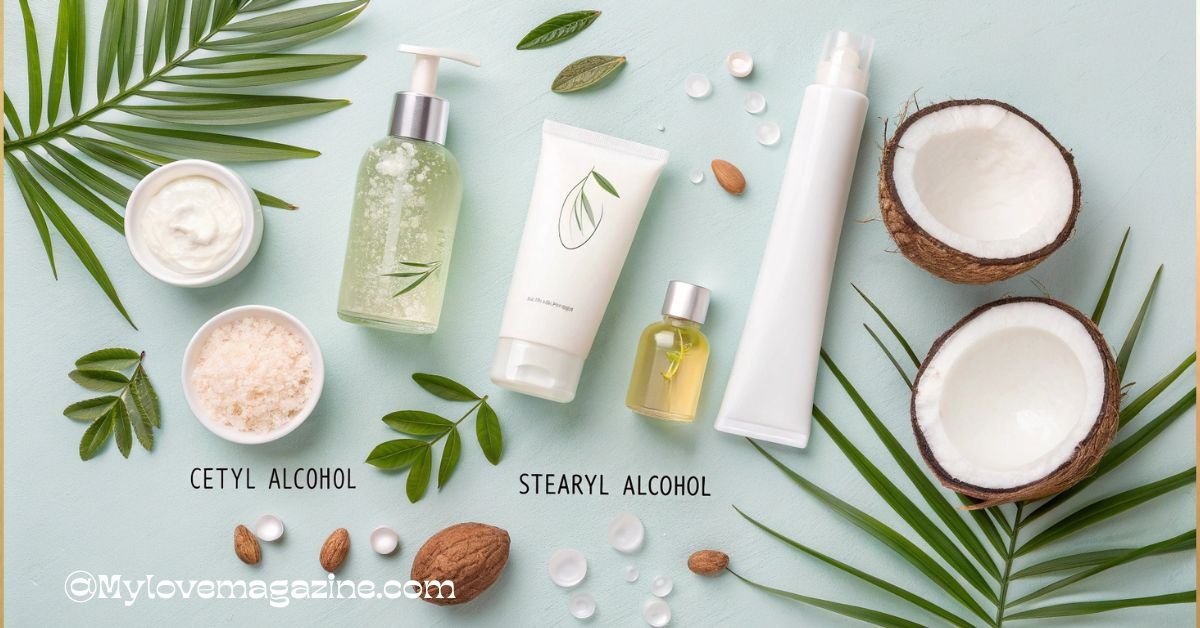Fatty Alcohols in Skincare: Benefits, Types, and Safety Guide!
Introduction
In the world of skincare, the word “alcohol” often rings alarm bells. But not all alcohols are created equal. Among the ingredients that have earned a misunderstood reputation are fatty alcohols. Unlike the drying alcohols many people avoid, fatty alcohols play a vital role in modern skincare, often enhancing the texture, stability, and hydration potential of products. As consumer awareness grows, understanding the difference between harmful and helpful alcohols is more essential than ever.
This article explores the chemistry, types, functions, and safety of fatty alcohols in skincare. Whether you’re a beauty enthusiast, a formulator, or just someone seeking the best for your skin, learning about fatty alcohols can transform how you view product labels and choose skincare. Let’s unravel the facts and separate the myths from the science. For more natural skincare insights and trusted ingredient breakdowns, platforms like Zicail.com are becoming go-to resources for both consumers and skincare professionals.
What Are Fatty Alcohols? (Chemistry + Sources)
Fatty alcohols are a category of long-chain alcohols derived from natural fats and oils, typically found in plants and animals. Chemically speaking, they consist of a hydrocarbon chain (ranging from 8 to 22 carbon atoms) and a single hydroxyl (-OH) group. Their structure gives them a waxy, emollient-like texture, making them ideal for skincare use.
These alcohols are usually derived from plant sources like coconut oil, palm oil, and rapeseed oil, though synthetic versions also exist. For example, cetyl alcohol can be obtained from both natural coconut oil and petroleum-based sources, depending on the manufacturer. The important point is that fatty alcohols are not volatile solvents like ethanol or isopropyl alcohol; instead, they behave more like emollient oils.
The most common sources include:
- Coconut oil (cetyl alcohol)
- Palm oil (stearyl alcohol)
- Jojoba oil (behenyl alcohol)
These natural sources make fatty alcohols sustainable and suitable for a wide range of skincare products aimed at improving moisture retention and product stability. In today’s clean beauty movement, many brands—including those featured on Zicail.com—prioritize naturally sourced fatty alcohols to ensure safety and efficacy.
Major Types Breakdown
Several types of fatty alcohols are frequently used in skin care, each with slightly different properties and roles:
Cetyl Alcohol
With 16 carbon atoms, cetyl alcohol is a medium-chain fatty alcohol derived from coconut or palm oil. It’s commonly used as an emollient and thickener.
Stearyl Alcohol
This fatty alcohol has 18 carbon atoms and is often paired with cetyl alcohol to form cetearyl alcohol. It offers softening effects and improves product texture.
Cetearyl Alcohol
A blend of cetyl and stearyl alcohols, cetearyl alcohol is widely used in creams and lotions to stabilize emulsions and create a rich feel.
Behenyl Alcohol
With 22 carbon atoms, behenyl alcohol is considered a long-chain fatty alcohol. It’s typically found in formulations for mature or sensitive skin due to its soothing properties.
Oleyl Alcohol
Derived from oleic acid, this alcohol helps improve spreadability and is often used in products targeting dry skin.
These variants are chosen by cosmetic chemists based on the desired product characteristics—whether it’s a lightweight lotion or a rich, heavy cream.
Their Roles in Cosmetics
Fatty alcohols serve multiple functional purposes in skincare formulations, far beyond being mere fillers or stabilizers. Here are their primary roles:
Emollients
Fatty alcohols act as emollients that help soften and smooth the skin by filling in tiny gaps in the skin’s surface. This improves skin texture and contributes to a healthy barrier.
Emulsifiers
Many fatty alcohols help keep oil and water components blended in a stable emulsion. Without these, your favorite moisturizer might separate over time.
Thickeners
These alcohols provide viscosity and body to creams and lotions, resulting in a luxurious texture that spreads easily and feels pleasant.
Stabilizers
Fatty alcohols contribute to the shelf stability of products, reducing the need for excessive preservatives and improving overall product longevity.
Their multifunctional nature makes them indispensable in cosmetic chemistry. From cleansers and sunscreens to serums and night creams, fatty alcohols in skincare ensure performance and elegance.
Comparing with Simple Alcohols
It’s crucial to understand the difference between fatty alcohols and simple alcohols, as they have vastly different effects on the skin.
Simple alcohols, such as ethanol, alcohol denat, and isopropyl alcohol, are low-molecular-weight compounds that evaporate quickly. While they can temporarily tighten pores and reduce shine, they often strip the skin of essential oils and compromise the skin barrier, leading to dryness and irritation.
Fatty alcohols, on the other hand, are high-molecular-weight, non-volatile compounds that condition and protect the skin. Their moisturizing and barrier-supporting effects make them beneficial, particularly for those with dry or sensitive skin.
| Alcohol Type | Common Examples | Skin Impact | Volatility |
| Simple Alcohols | Ethanol, Isopropyl | Drying, Irritating | High |
| Fatty Alcohols | Cetyl, Stearyl, Oleyl | Moisturizing, Soothing | Low |
Recognizing this distinction helps consumers avoid unnecessary product rejections and appreciate ingredients that benefit their skin.
Perks They Bring to Skin
Fatty alcohols offer a wide range of benefits for the skin, particularly when used in thoughtfully formulated products.
- Hydration Boost: Fatty alcohols act as occlusives, forming a protective film that locks in moisture. This is especially helpful in dry or cold climates.
- Barrier Support: They help reinforce the skin’s lipid barrier, which protects against environmental stressors, allergens, and pathogens.
- Improved Texture: Products with fatty alcohols often feel smoother and richer, enhancing the overall user experience.
- Enhanced Absorption: They can help other active ingredients penetrate better by creating a stable and even base.
- Long-Lasting Moisture: Unlike humectants, which attract water, fatty alcohols prevent water loss, making them ideal in combination products.
Whether you have dry, combination, or mature skin, incorporating fatty alcohols can help maintain a healthy, well-moisturized complexion.
Risks & Safety
Although fatty alcohols are generally considered safe and non-irritating, there are exceptions. Some individuals may experience sensitivity or allergic reactions, particularly if they have preexisting skin conditions like eczema or rosacea.
Studies and regulatory bodies such as the Cosmetic Ingredient Review (CIR) and the FDA deem fatty alcohols safe for use in cosmetics. However, product formulation and concentration matter. In rare cases, high concentrations of certain fatty alcohols may clog pores or cause breakouts, especially for acne-prone users.
To avoid adverse reactions:
- Perform a patch test before trying new products
- Consult a dermatologist if you have chronic skin conditions
- Check the full ingredient list for combinations with comedogenic oils or fragrances
Moderation and context are key. A well-formulated product that includes fatty alcohols should provide benefits without introducing risks.
Who They’re For (and Who They’re Not)
Fatty alcohols can be a great addition to most skincare routines, but they may not suit absolutely everyone.
Ideal Users
- Dry and Dehydrated Skin: Their occlusive and emollient properties help retain moisture.
- Mature Skin: Helps restore the compromised lipid barrier and improve suppleness.
- Sensitive Skin: Gentle and non-irritating when formulated correctly.
Use with Caution
- Acne-Prone Skin: Although not inherently comedogenic, fatty alcohols combined with other ingredients may lead to clogged pores.
- Oily Skin Types: Lightweight formulations are preferable; avoid thick creams with multiple heavy occlusives.
Ultimately, the effectiveness of fatty alcohols depends on the overall product formulation and your unique skin profile.
Product Selection & Labeling
Navigating product labels can be overwhelming, but knowing what to look for makes all the difference. Fatty alcohols typically appear under names such as:
- Cetyl Alcohol
- Stearyl Alcohol
- Cetearyl Alcohol
- Behenyl Alcohol
- Oleyl Alcohol
Choosing the Right Products
Look for fatty alcohols in:
- Moisturizers
- Cleansers
- Sunscreens
- Night Creams
The position of these ingredients on the label can hint at their concentration. Ingredients listed earlier are typically more concentrated. For oily or acne-prone skin, seek formulations where fatty alcohols appear further down the list.
Pro tip: Brands with a focus on sensitive or dermatologically tested products often use fatty alcohols responsibly, combining them with ceramides, niacinamide, or hyaluronic acid for extra benefits.
Alternatives for Sensitive Users
If you find that fatty alcohols don’t agree with your skin, several alternatives offer similar benefits without the risk of irritation.
Emollient Alternatives
- Squalane: A lightweight, non-comedogenic oil that mimics skin’s natural sebum.
- Shea Butter: Rich in fatty acids, provides similar barrier protection.
Occlusive Alternatives
- Petrolatum: Highly effective water-loss barrier, though heavier in texture.
- Lanolin: A natural emollient from sheep’s wool (not suitable for vegans).
Natural Oils
- Jojoba Oil: Closely mimics the skin’s oil.
- Argan Oil: Lightweight, rich in antioxidants.
These alternatives can help achieve similar moisture retention and texture goals, especially when used in combination with humectants like glycerin or aloe vera.
Final Thoughts & Actionable Tips
Fatty alcohols in skincare are often misunderstood due to the negative connotation associated with the word “alcohol.” In reality, they are beneficial, multifunctional ingredients that enhance product performance, support the skin barrier, and improve hydration.
To incorporate fatty alcohols safely and effectively into your skincare routine:
- Read ingredient labels carefully
- Consider your skin type and specific concerns
- Choose formulations from reputable brands
- Don’t judge a product solely by the presence of the word “alcohol”
With a little knowledge and awareness, you can confidently choose skincare products that contain fatty alcohol and benefit from everything they offer.
Also read:














Post Comment